10 Worst Foods to Eat After Your Workout
You might know what to eat before working out. But do you know what to avoid after your workout? Alain Gonzalez is a fitness coach and expert who specializes in helping men over 40 build muscle. In a viral YouTube video, he discusses post-workout food. "After working out, your body is primed to replenish and rebuild. Choosing the wrong post-workout foods, however, can stifle your progress and destroy your ability to lay down new muscle tissue. So if you're serious about building muscle, then you must pay attention to what you're eating post-workout," at the start of the clip.
Eating Nothing
Number one is eating nothing. "Skipping food after a workout, especially protein sources, is a very bad idea. While the 30-minute anabolic window is not as significant as we once believed, there's still a certain point after your workout where what you eat can positively impact your training adaptations," he explains. "This new anabolic window is a three to six-hour range between your pre and post-workout meals. So if you ate two hours before you trained and then trained for one hour, you have about two to three hours post-workout to consume a meal in order to optimize recovery."
Sugary Foods
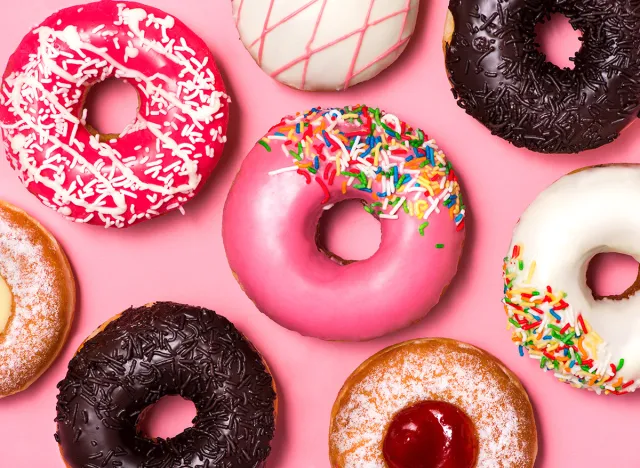
Number two, sugary foods. "Many of us have been told that post-workout carbs are critical for replenishing glycogen stores. The truth, however, is that most typical weight training sessions don't actually deplete glycogen to any significant degree," he says. "Now, this is not to say you should purposely skip carbs post-workout, but rather that you shouldn't use this post-workout window as an excuse to fill up on high glycemic foods such as donuts, pastries, sports, drinks, or energy bars. It's no secret that a high-intensity workout can leave you depleted and hungry, causing cravings to kick in. But opting for hyper-palatable food while you're starving is an easy way to overeat and exceed your calorie goals for the day."
Alcohol
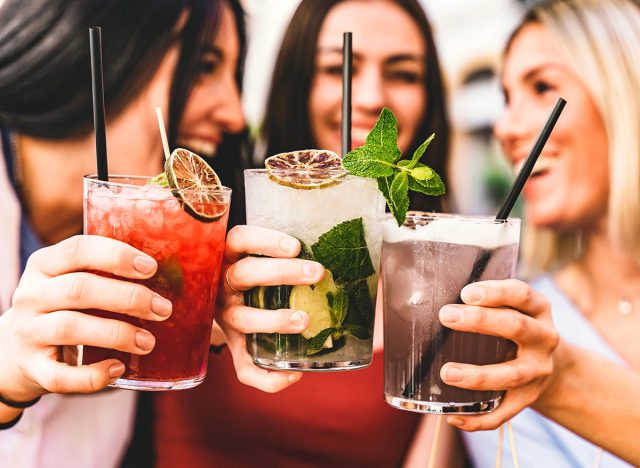
Number three is alcohol. "While alcohol might not make you weaker for your next lifting session, it will prevent you from recovering optimally and building new muscle tissue. Not only that, but alcohol also provides empty calories, meaning that it doesn't provide any nutritional benefit. And while I won't tell you to cut alcohol completely, I would suggest that you keep it in moderation and avoid consuming it after your workout," he explains.
High Fat Fast Food
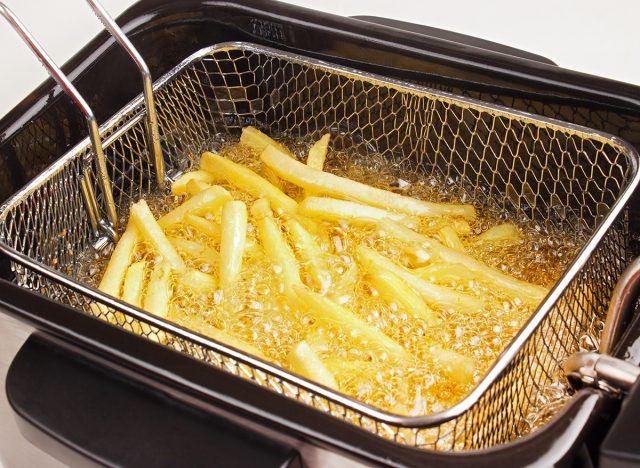
Number four: high-fat fast food. "While it may be a quick and easy way to satisfy your hunger, these high-calorie foods can negate the calories you burn during your workout, especially if your goal is to lose weight or cut fat. Thus, you'd be better off focusing on clean sources of protein and carbs post-workout to optimize recovery and growth," he explains. "Not only that, but foods that are high in fat can slow down the digestion process, delaying the delivery of crucial nutrients, such as protein and carbs, that are necessary for post-workout recovery, hindering muscle growth and repair. Limiting your fat intake after a workout will not only help nutrients reach the muscles faster, but it'll make it far easier to stay within your calorie goals for the day."
Salads and Raw Vegetables
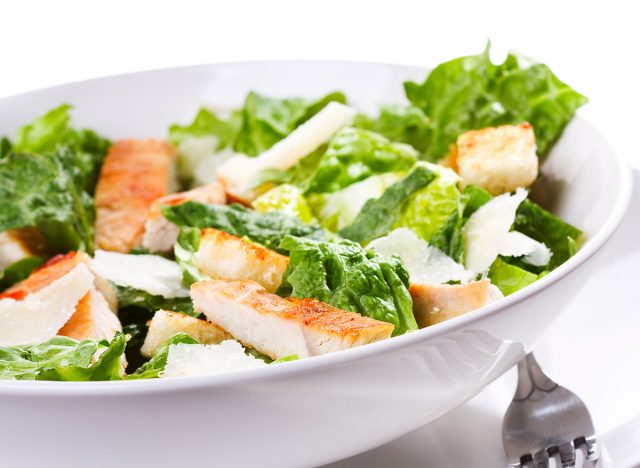
Number five, salads and raw vegetables. "While vegetables are indeed healthy, they are not the best option for a post-workout meal," he reveals. "Although they are packed with essential micronutrients, they lack the necessary macronutrients that your body needs to recover properly. After a workout, during exercise, you stimulate growth and even break down muscle tissue. This turns your muscles into a sponge ready to absorb vital nutrients, especially protein, to adapt to the stimulus of the workout. Raw vegetables and vegetable-only salads leave your body undernourished. Furthermore, vegetables are high in fiber, which can also slow down the digestion process, making it harder for your body to absorb the necessary nutrients quickly. While they are micronutrient-dense, they lack the nutritional basics of a great post-workout meal. That said, if you do insist on having a salad post-workout, make sure to add some sliced steak, roasted chicken breast, a cup of Greek yogurt, or even just the protein shake on the side to feed your muscles what they need to grow."
Fruit
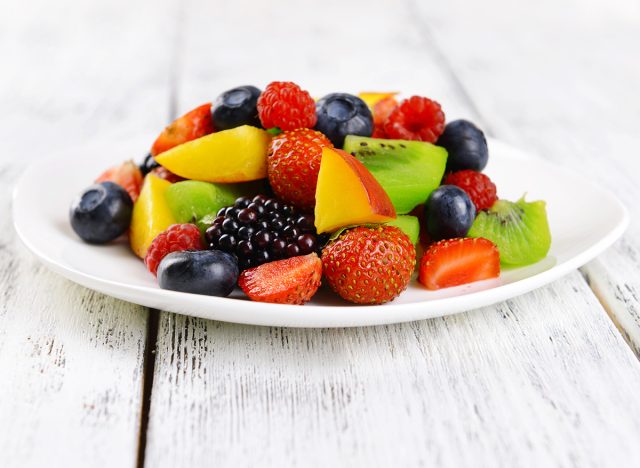
Number six fruit. "While fruits are a great source of vitamins, minerals, and antioxidants, they're primarily composed of carbs in the form of simple sugars. Consuming a high amount of simple sugars can cause a rapid spike in blood sugar levels, which can lead to an insulin response that triggers the storage of excess sugars as fat," he explains. "And while fruits are a healthy addition to any diet when consumed post-workout, they should be combined with a protein source to maximize your results. So if you're in the mood for a fruit smoothie directly following your workout, just be sure to add a bit of protein so your body has the necessary building blocks to promote and sustain muscle growth."
Salty Foods
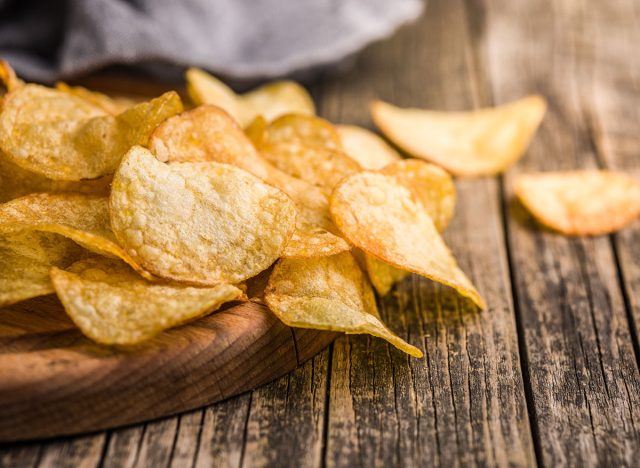
Number seven, salty foods. "While it may be tempting to indulge in salty foods like potato chips after a workout, it's important to recognize that this type of food is also hyper-palatable. And before you argue that Doritos are a great way to replenish electrolytes, consider this: While sodium and chloride, aka table salt, are important electrolytes used by the body for various functions," he says. "Consuming too much of these electrolytes through high sodium foods can throw off the body's balance of other key electrolytes like potassium and calcium. This imbalance can prolong fatigue and impair muscle function because your body loses electrolytes during a workout. The last thing you need is to deplete more potassium and calcium with a salty bag of chips."
Caffeinated Energy Drinks
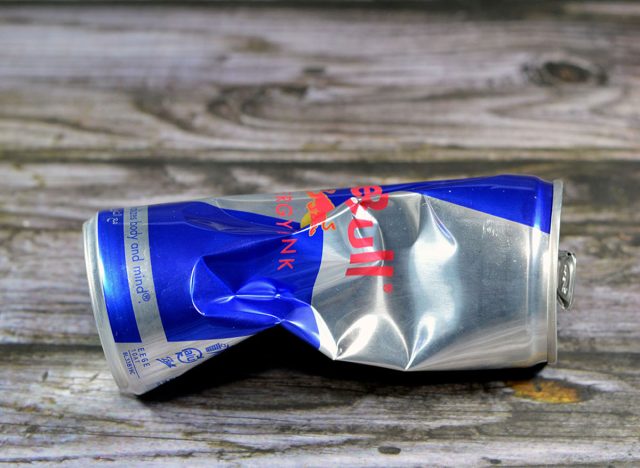
Number eight are caffeinated energy drinks. "While I'm a huge advocate of pre-workout caffeine for increased performance, consuming caffeinated drinks as a post-workout beverage will do more bad than good," he reveals. Firstly, caffeine is a diuretic, "which means it can lead to dehydration. During a workout, your body loses a lot of fluid through sweat, and it's important to rehydrate properly right after consuming caffeinated drinks. It can worsen dehydration, making it hard to repair and rebuild," he continues.
Secondly, caffeine can negatively impact sleep quality, which is crucial for proper recovery. Sleep is arguably our most anabolic state, as is when the body repairs and rebuilds muscle tissue. Consuming caffeinated drinks after training, especially in the afternoon or evening, can disrupt sleep and negatively impact recovery. Finally, energy drinks often contain high amounts of sugar and artificial sweeteners, which can lead to inflammation and poor gut health. These ingredients can also lead to a spike in blood sugar, followed by a crash leading to decreased energy levels. It's important to prioritize proper hydration post-workout. Opting for water, coconut water, or a protein shake are far better options for refueling and rehydrating the body."
Antioxidant Supplement
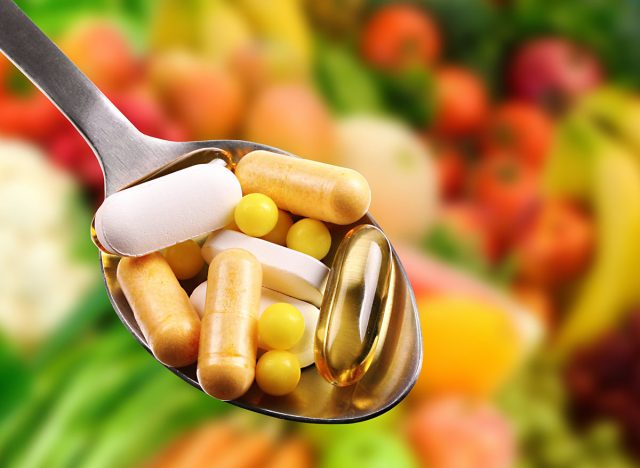
Number nine, antioxidant supplements. "The antioxidants basically take the job from your mitochondria and handle the stress themselves, thus preventing muscular adaptations from occurring. Exercise-induced oxidative stress is a normal physiological process that plays an important role in promoting muscle adaptation and growth by consuming antioxidant supplements. After a workout, you interfere with this process and the body's ability to naturally adapt to the stress of training," he says.
NSAIDs
And lastly, NSAIDs or nonsteroidal anti-inflammatory drugs. "Taking NSAIDs such as ibuprofen may seem like a quick fix to reduce or prevent post-workout soreness. While it might help you achieve that, its other effects are actually counterproductive to your fitness goals," he says. "One study published in the American Journal of Physiology has shown that compared to those who took a placebo, the participants that took NSAIDs had significantly suppressed muscle protein synthesis after resistance exercise. Instead of relying on pills, try foam rolling or active recovery techniques like going for a walk or hopping on a spin bike after a brutal leg day. These can help improve blood flow and reduce muscle soreness. Remember that soreness is a natural part of the muscle-building process, and masking it with painkillers may prevent you from achieving your full potential." And if you enjoyed this article, don't miss I Hit 60 and These 15 Anti-Aging Foods Keep Me Fit and Feeling 20 Years Younger.





